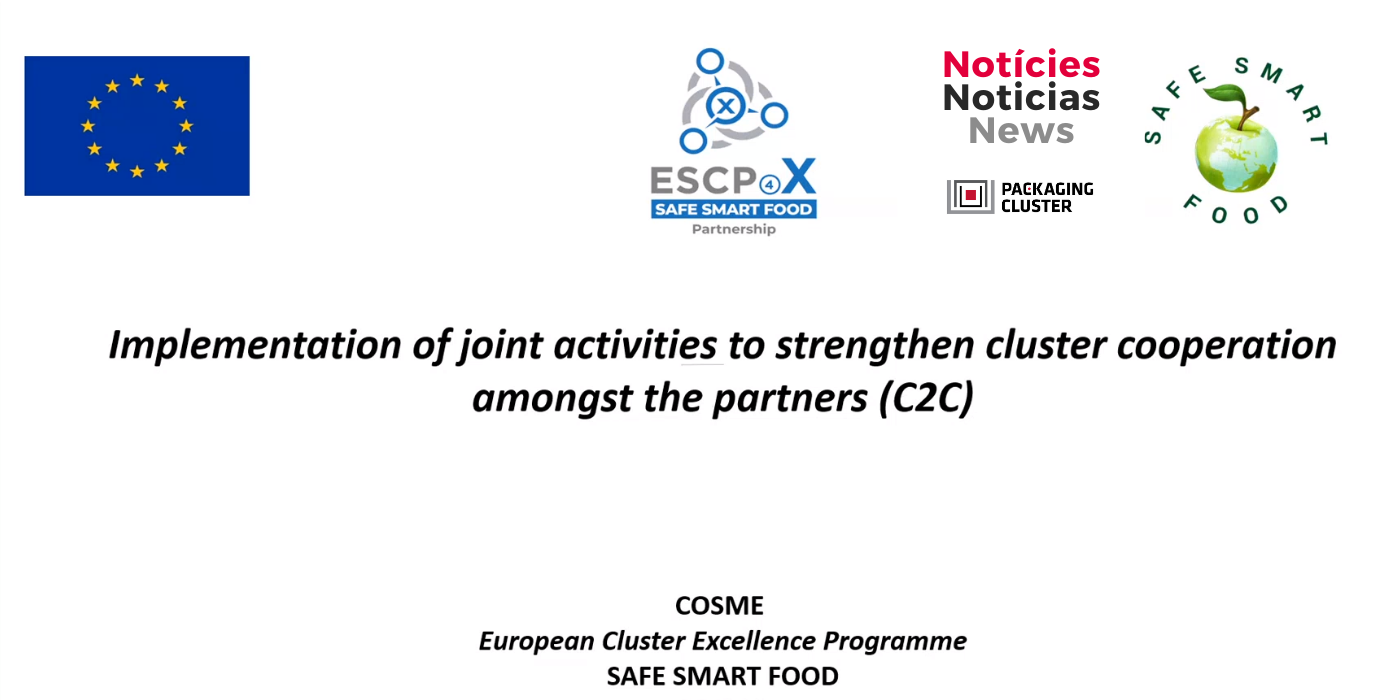C2C meeting to share experiences and good practices in the generation of European innovation projects, within the framework of the SAFE SMART FOOD project

Last Tuesday, 8th of September, the European consortium, coordinated by Packaging Cluster, within the COSME European Cluster Excellence Programme, Safe Smart Food project, brought together different professional experts in project management for the transfer of knowledge between the entities involved. Experiences, opportunities, tips, and good practices for the achievement of excellence were shared during the conference.
The implementation of joint activities to strengthen cluster collaboration amongst partners is one of the actions included in the project’s framework with the purposes of:
- Coaching and raising cluster coordinators and its partners
- Promoting cross-cluster learning and exchange of knowledge
- Facilitating cluster-to-cluster collaboration actions for helping clusters organizations
- Organising study-visit to share experiences and good practices
- And strengthen closer cooperation to build trust and relationships aimed to improving the business environment for SMEs
To do so, the consortium organised two knowledge and expertise sharing virtual meetings (the second one yet to come) about best practices of format of support service that excel in quality, added value and strategic fitness to enhance cluster SMEs competitiveness, innovation, and growth; and a peer learning and knowledge sharing session about joint innovation challenges for speed up SMEs development and growth.
This virtual meeting was the perfect occasion to connect, in real time, with the organizations in charge of the Safe Smart Food project, which are spread throughout Europe: the Packaging Cluster and Foodservice Cluster, from Spain; Business Upper Austria, from Austria; Food Products Quality Cluster, located on Latvia; and the SMART Food Cluster, in Lithuania. In addition, we could learn about different work methodologies used to address a correct execution of collaborative innovation projects, aligned with the strategy of the European Union.
After a first introduction and presentation round moderated by Heidrun Hochreiter, cluster manager of the Food-Cluster in Business Upper Austria, the coordinator of the Smart Food Cluster, Giedrius Bagusinskas, explained the opportunities and benefits of the ERASMUS+ programme, such as support for education, training, youth and sport in Europe, with a total budget of 14.7 billion euros.
Giedrius presented some examples carried out by his organization in support of cluster management, as well as the creation of a network for training in order to the knowledge transfer, such as DIGIFOF.
Following this, Horizon 2020 expert and consultant Janis Ancans shared his experience with participation trends in Latvia's bioeconomy. Horizon 2020 is a funding program that distributes around 80 billion euros for innovation and research, which requires a tough selection process and many requirements. Only 1 in 8 proposal is selected.
In this sense, Janis Ancans provided a series of tools to help us make our project adjust to the demands of the program, as in the case of the Baltic Biomaterials Centre of Excellence or CAMART2.
Then, Josep Casamada, Project Manager in AEI Tèxtils, explained how the Catalan cluster has presented several proposals in the COSME programme, which has a budget of 2.3 billion euros in support of SMEs and entrepreneurs.
Even though ongoing projects are paralyzed due to the pandemic, Casamada highlights the benefits of carrying out international missions and strategic exchanges, where relationships are strengthened, and lasting consortiums are generated, a culture of internationalization. Also, he offered some tips, such as: to be ambitious when setting our project objectives and that, at the same time, to correspond to the points determined in the call, without forgetting to choose partners who add value to the project , for their specialization and knowledge.
Next, Christoph Reiss-Schmidt, from Business Upper Austria, explored the challenges and opportunities of the H2020 programme, with data of interest to the participating entities, such as that in the last call, around 50% of the estimated budget of the selected projects was financed.
In 2019, the Austrian entity promoted the DIGIBCUBE project, which seeks to unlock the potential for cross-sector collaboration of SMEs by combining different technologies applied to medicine and offering patients a fast and efficient diagnosis-treatment system.
To finish, Emma Vendrell, Head of International Projects of ACCIÓ, presented the future calls and funding opportunities in the European Union, such as the COSME Cluster Go International, which in its third generation aims to exceed the ratio of 23 partnerships presented last year; or the Cluster Excellence, which is expected to open the registration period before the end of the year.
In 2020, the transition will mark the direction of the European projects: the climate transition, towards sustainability, and the transition towards digital, digitization. As Emma Vendrell said, we can see this fact reflected in other calls such as the aforementioned Erasmus+, the LIFE programme, the ENI CBC “Mediterranean Sea Basin Program” or the Interreg.
Nicolas Espitalier from B-LINK, was in charge of finishing the session. He proposed that we should establish a participation strategy, aligned with European policies, where we answer a series of questions to determine if what we are doing, we are doing well. He also provided us with a series of tools and consultation pages on updated calls.
In the end, a debate between the professionals present on the webinar came out and the questions and doubts were solved.
After this CSC meeting, it’s on the way the international hackathon Hack AgriFood’20, to find solutions for the agriculture and food sector to the challenges caused by the COVID-19 crisis and another C2C about the future trends in agrifood and related sectors. Check this and all the news out about European Project Safe Smart Food, on its LinkedIn, Twitter and Facebook profile.